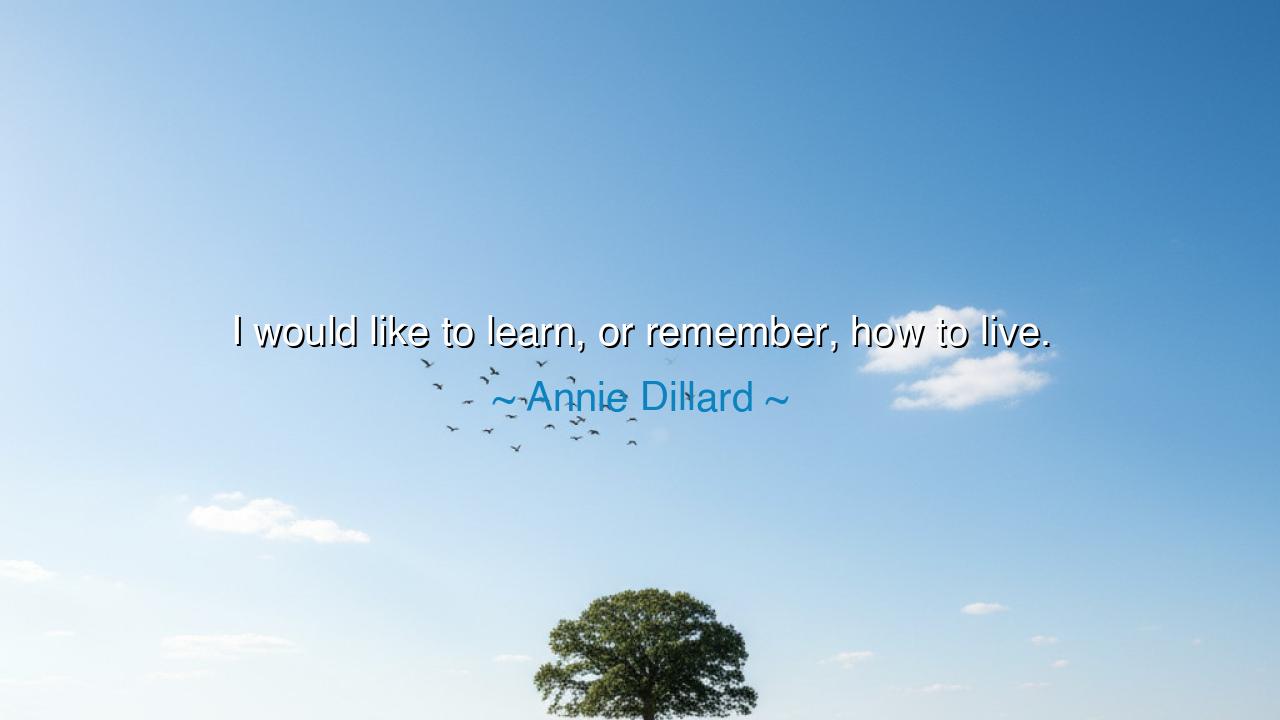
I would like to learn, or remember, how to live.






Annie Dillard, contemplative seeker of the divine woven into nature’s fabric, once wrote with piercing simplicity: “I would like to learn, or remember, how to live.” These words, gentle yet thunderous, strike at the heart of human existence. They confess that the art of living is not always innate, not always clear, and that sometimes the soul must be taught again what it once knew. To truly live is not merely to survive, to toil, or to pass the days—it is to awaken to meaning, to embrace wonder, to live with intention and depth.
The origin of these words is rooted in Dillard’s meditations on creation and life’s fleeting nature. Surrounded by the wild intricacies of the natural world, she recognized both the grandeur and the fragility of existence. Her cry is both a plea and a remembrance—that perhaps we are born with the knowledge of how to live, but as years pass, we forget. Childhood holds a glimpse of this truth: the ability to marvel at the simple, to laugh without burden, to see each moment as an eternity. Yet adulthood often buries this under duty, ambition, and distraction. Dillard’s quote is a call to return to that forgotten wisdom.
The ancients understood this yearning. Socrates declared that the unexamined life is not worth living, for he knew that true living requires awareness and purpose. The Hebrews, too, wrote of choosing life, of turning hearts away from death in spirit even while breathing. And the Buddhists sought mindfulness—the practice of remembering, in every moment, what it means to be alive. Dillard’s words echo these traditions, standing as a bridge between modern searching and ancient wisdom.
History offers us powerful examples. Consider the life of Leo Tolstoy. Surrounded by wealth, fame, and success, he fell into despair, realizing he had forgotten how to live. Though he had written great novels, his spirit was empty. He sought again the simplicity of faith, the humility of work, and the honesty of love. In rediscovering these, he remembered how to live, and in that remembrance, he found peace. Dillard’s plea reflects this same journey: the recognition that life must be re-learned when the soul grows weary or distracted.
Her words also remind us that living is not merely a biological act but a spiritual discipline. To breathe, eat, and labor is one thing; to live with joy, with gratitude, with openness to beauty is another. Many pass through decades as though asleep, blind to the miracle of their own existence. To say, “I would like to remember how to live,” is to confess that life can slip from us even while we still breathe, and that we must consciously return to it.
The lesson is luminous: never assume that you already know how to live. Seek it daily, in small ways and large. Learn to pause and notice the sky, the laughter of a child, the kindness of a stranger. Remember that love is more enduring than ambition, that gratitude is richer than wealth, that wonder is more vital than routine. In choosing these, you re-learn life as Dillard longed to.
Practical actions follow easily. Begin each day with awareness: ask yourself not only what must I do today? but also how shall I live today? Practice gratitude. Revisit the joy of creation, whether in nature, in music, in silence, or in prayer. And above all, guard against forgetfulness—remind yourself that life is short, and each breath is a gift to be lived, not squandered.
So let this teaching endure: to live is an art, and sometimes we must learn it anew. As Annie Dillard reminds us, we are not merely creatures of habit and duty—we are beings capable of wonder, of joy, of profound presence. Let us not forget. Let us remember how to live, and in remembering, awaken again to the beauty and power of existence.






AAdministratorAdministrator
Welcome, honored guests. Please leave a comment, we will respond soon